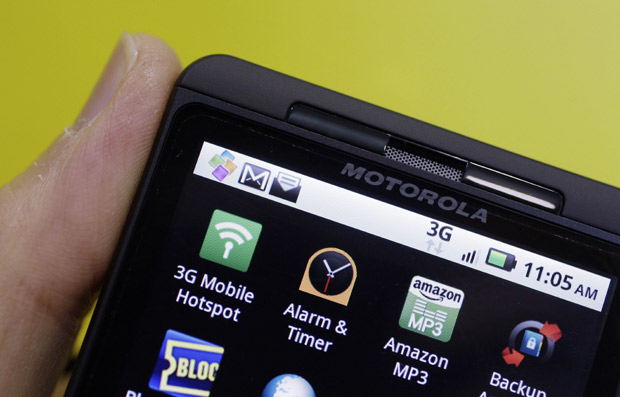
Google Inc. announced Monday it is buying cellphone maker Motorola Mobility
Holdings Inc. for US$12.5 billion in cash. It’s by far Google’s biggest
acquisition to date and a sign the online search leader is serious about
expanding beyond its core Internet business.
Meanwhile shares of Canadian technology giant Research In Motion Ltd. (RIM)
edged higher Monday on the news of the Motorola deal. There is speculation that
investors might be betting that RIM could become a takeover target in a
consolidating smartphone industry.
For more on how this could affect consumers and Blackberry makers –
Research in Motion (RIM) – we talked to regular Global News contributor
and tech guru – Steve Makris.
Why is Google buying Motorola – and at such a high premium?
Motorola was one of the early innovators of Google’s licensed Android
operating system and have since shown leading innovation with unique features
on their “Droid” phones, like being able to organize your social network
contacts and goings on in one place. Google’s initial attempts to sell
its own phones made by HTC and Samsung did not do as well as expected. Google
can use Motorola’s hardware and software innovation technology to move its OS
on a faster track.
Is this a smart business decision?
It’s a win-win for both Motorola who gets a shot in the arm in a very
competitive smart phone market. Google get’s more out of this deal as not only
will it own a phone maker, like Apple does, but will own Motorola’s potentially
lucrative patents. This will fortify Google’s (and partner phone and tablet
makers) current licensing battles with Apple.
What are consumers likely to see come out of this?
Consumers will have more choices of Android-based phones, as Google has
said it wants to keep its Android licensing deals with other phone and tablet
makers like Samsung, LG and HTC. This means a stronger Google Android market
share, more competition, better prices and more applications competing against
Apple’s App Store, the current application development leader for iPhones and
iPads. Google can use Motorola’s TV box top expertise to make inroads on
a combined offering of smart phones and home entertainment, on multiple
platforms. Shaw Media going in the same direction with their acquisition of
Global TV and proposed cellphone bandwidth plans. Eventually consumers will
have a choice of one-stop shopping for their mobile, computer and home
entertainment.
RIM shares were up slightly on the news of the Google-Motorola deal
– Could they be next?
RIM has shuffled its decision-making group in an effort to keep eroding
market share. RIM also launched three new well designed smart phones last
Friday keeping “on the fence” BlackBerry owners around for a bit longer.
Who would be the likely buyer – and why?
Seasoned industry observers, like watchdog DirectionsonMicrosoft.com’s
Michael Cherry would not be surprised if Microsoft bought BlackBerry. This
makes sense as most BlackBerry users are Windows users. But how this would play
out with the recent Microsoft Phone 7-Nokia relationship is anyone’s
guess.
Would this potentially save the Waterloo based smart phone
maker or could they continue to go it alone? What does RIM need to do
to survive?
RIM needs to get its hardware and software in order. It paid some lip
service to consumers several years ago with colourful small BlackBerry devices
like flip phones. Simply making nicer new phones will barely keep customers
from switching. RIM’s best hope now is to fast-track their
“still-in-development” PlayBook (one of the best designed tablets anywhere)
making it work better with its BlackBerry phones. It also needs to switch its
BlackBerry phones with the newer PlayBook QNX operating system for better
connectivity. The ability for the PlayBook to run Android apps, later this
summer, might also buy time. RIM can only hope for a come-from-behind situation
or at best, simply keep its market share.
What does the future hold for all these competing wireless industry
companies?
Microsoft’s partnership with Nokia is still a questionable move and may
delay the inevitable: Of the six big name Android OS phone makers Samsung, LG
and HTC (who also make fewer Microsoft Phone 7 phones) and Motorola
(Android only) and Apple, BlackBerry and Nokia only two may survive on
the long run. The likely survivors are those who own both the hardware,
software and have a large application community. This means Apple and
Google-Motorola. It’s interesting to note that two Korean phone makers still
make and sell their own operating system; Samsung’s Wave phone in Canada and LG
(only in Korea). Both alluded to keeping their own OS alive as a future option
in the event of an “end of the honeymoon” with Google.
Check out Steve’s weekly GlobalTV Morning News tech segment at www.techuntangled.ca
With files from The Canadian Press and The Associated Press



Comments